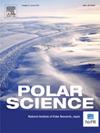Unveiling risk factors influencing the selection of the Northern Sea Route: A conjoint analysis approach for Japanese shippers
IF 2
4区 地球科学
Q3 ECOLOGY
引用次数: 0
Abstract
This paper explores how Japanese corporations assess risks associated with using the Northern Sea Route (NSR) as a new maritime transport route in Asia and identifies measures to promote its usage. We address two key questions: (1) What risks influence shippers' route choices in maritime transport? (2) Does risk evaluation vary by cargo type and company size? Using choice-based conjoint analysis and a conditional logit model with online survey data, we identified five main risk factors influencing shippers: route unavailability rate, delay probability, piracy probability, transport costs, and war conditions, ranked in importance from highest to lowest as war conditions, delay probability, transport costs, route unavailability rate, and piracy probability. Additionally, the risk factors significantly influencing route selection were found to be robust, showing minimal variation across company size, type of trade (import/export), and the nature of the goods transported. Our findings suggest several policy implications. Diplomatic efforts are crucial for safe vessel navigation on the NSR. Government initiatives should focus on reducing transport delays through technology investments and implementing strategies to decrease NSR delay rates without increasing shippers' costs. Additionally, emphasizing the lower piracy risks on the NSR compared to Suez Canal Route could boost its attractiveness.
揭示影响北海航线选择的风险因素:日本托运人的联合分析方法
本文探讨了日本企业如何评估使用北方海路(NSR)作为亚洲新海运路线的相关风险,并确定了促进其使用的措施。我们解决了两个关键问题:(1)在海上运输中,哪些风险影响托运人的航线选择?(2)风险评估是否因货物类型和公司规模而异?利用基于选择的联合分析和基于在线调查数据的条件logit模型,我们确定了影响托运人的五个主要风险因素:路线不可用率、延误概率、海盗概率、运输成本和战争条件,从高到低依次为战争条件、延误概率、运输成本、路线不可用率和海盗概率。此外,发现显著影响路线选择的风险因素是稳健的,在公司规模、贸易类型(进口/出口)和运输货物性质之间的差异最小。我们的研究结果提出了几个政策启示。外交努力对船只在北极航道上的安全航行至关重要。政府的举措应侧重于通过技术投资和实施战略,在不增加托运人成本的情况下减少运输延误。此外,与苏伊士运河航线相比,强调北方航道的海盗风险较低可能会提高其吸引力。
本文章由计算机程序翻译,如有差异,请以英文原文为准。
求助全文
约1分钟内获得全文
求助全文
来源期刊

Polar Science
ECOLOGY-GEOSCIENCES, MULTIDISCIPLINARY
CiteScore
3.90
自引率
5.60%
发文量
46
期刊介绍:
Polar Science is an international, peer-reviewed quarterly journal. It is dedicated to publishing original research articles for sciences relating to the polar regions of the Earth and other planets. Polar Science aims to cover 15 disciplines which are listed below; they cover most aspects of physical sciences, geosciences and life sciences, together with engineering and social sciences. Articles should attract the interest of broad polar science communities, and not be limited to the interests of those who work under specific research subjects. Polar Science also has an Open Archive whereby published articles are made freely available from ScienceDirect after an embargo period of 24 months from the date of publication.
- Space and upper atmosphere physics
- Atmospheric science/climatology
- Glaciology
- Oceanography/sea ice studies
- Geology/petrology
- Solid earth geophysics/seismology
- Marine Earth science
- Geomorphology/Cenozoic-Quaternary geology
- Meteoritics
- Terrestrial biology
- Marine biology
- Animal ecology
- Environment
- Polar Engineering
- Humanities and social sciences.
 求助内容:
求助内容: 应助结果提醒方式:
应助结果提醒方式:


